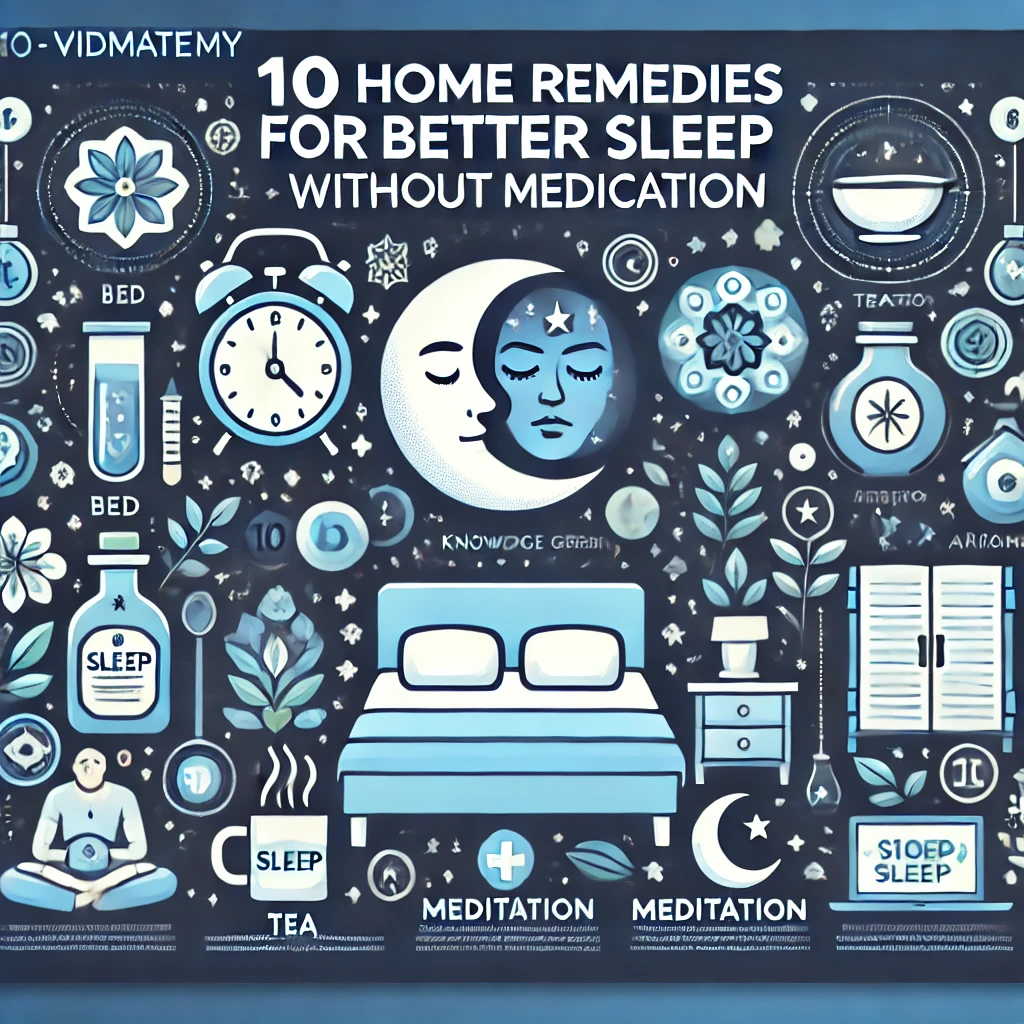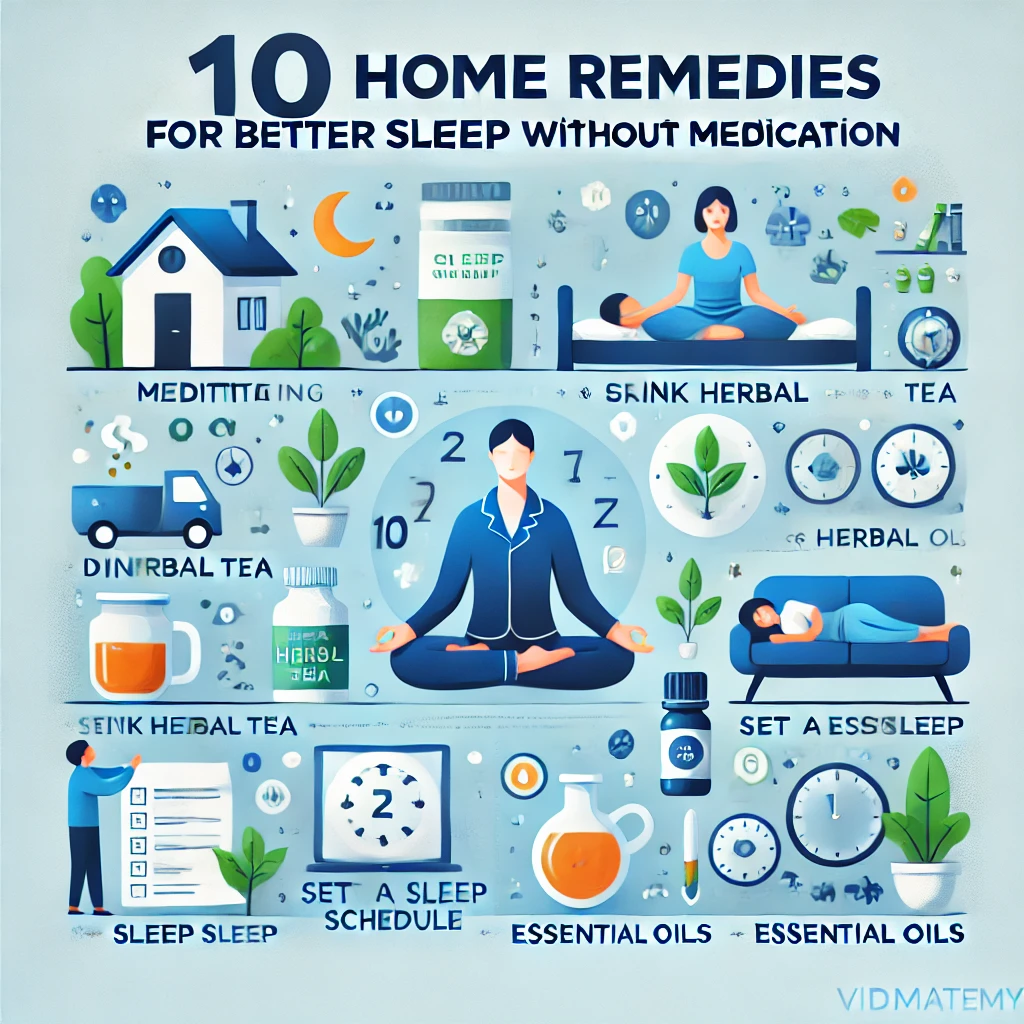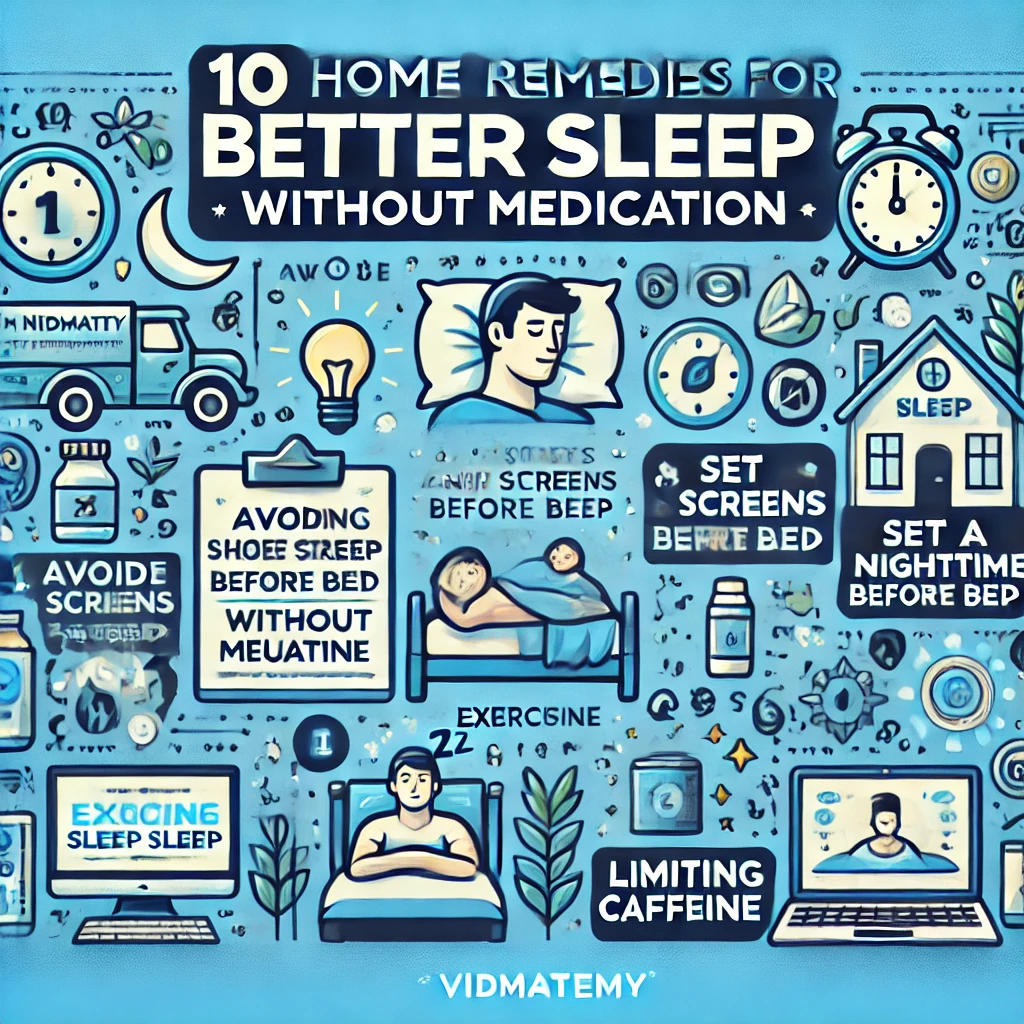Struggling with sleep issues? You’re not alone. Many people experience difficulty falling asleep or staying asleep, which affects overall health and productivity. While medication can help, natural remedies can be just as effective without the side effects. Here are 10 home remedies to improve sleep naturally.
- Aim for 7-9 hours of sleep each night.
- Set a regular wake-up time, even if you had a late night.
- Use alarms or reminders to stick to your sleep schedule.
- Avoid long naps during the day, which may interfere with nighttime sleep.
- Reading a book – Preferably something light and not too stimulating.
- Taking a warm bath – Helps lower body temperature and induces sleep.
- Practicing deep breathing exercises – Techniques like the 4-7-8 method help relax the nervous system.
- Listening to soothing music – Slow, instrumental tunes can create a calming atmosphere.
- Practicing meditation or mindfulness to clear your thoughts.
- Using progressive muscle relaxation to release tension.
- Cool (around 60-67°F or 16-19°C)
- Dark (use blackout curtains or an eye mask)
- Quiet (use earplugs or a white noise machine if needed)
- Comfortable (invest in a good mattress and pillows)
Keeping the bedroom free from distractions such as TVs, bright lights, and noisy devices can greatly improve sleep quality. Decluttering your room and using relaxing colors can also contribute to a peaceful atmosphere.
- Use blue light filters on your devices.
- Replace screen time with reading or journaling.
- Keep your phone outside the bedroom to avoid distractions.
- Try using dim lighting in the evening to promote relaxation.
- Chamomile tea – Contains apigenin, which promotes relaxation.
- Valerian root tea – Helps reduce anxiety and improve sleep.
- Lavender tea – Known for its calming effects.
- Lemon balm tea – Reduces stress and promotes better rest.
- Peppermint tea – Soothes the digestive system, making it easier to relax.
- Passionflower tea – Helps improve sleep quality and reduce insomnia.
- Lavender oil – Lowers heart rate and blood pressure, leading to deeper sleep.
- Eucalyptus oil – Clears airways and improves breathing for uninterrupted rest.
- Ylang-Ylang oil – Promotes relaxation and reduces stress levels.
- Bergamot oil – Helps lower cortisol levels and induces calmness.
- Walking
- Jogging
- Yoga
- Stretching exercises
- Light resistance training
However, avoid intense workouts within 2-3 hours of bedtime, as they can be too stimulating. Morning exercise is especially beneficial for improving sleep quality.
- Meditation – Helps calm the mind and promotes relaxation.
- Journaling – Writing down thoughts can help clear your mind.
- Gratitude exercises – Focusing on positive aspects of your day reduces stress.
- Talking to a friend or therapist – Expressing concerns can lighten your mental load.
- Practicing guided imagery to promote a sense of calm before bed.
- Foods rich in magnesium (bananas, almonds, spinach)
- Protein sources like turkey and eggs (contain tryptophan, which aids sleep)
- Whole grains such as oatmeal and brown rice
- Warm milk – Contains calcium and tryptophan, both of which promote sleep.
- Kiwi and tart cherries – Both are natural sources of melatonin.
- Take a morning walk to boost energy levels.
- Open curtains during the day to let in natural light.
- Reduce exposure to artificial lighting at night to encourage melatonin release.
- Spend time in nature or a park to reduce stress and improve sleep quality.
Create a Natural Bedtime Routine
Improving your sleep doesn’t always require medication — sometimes, simple home remedies can do wonders. One of the best ways to sleep better is by developing a consistent and calming bedtime routine.
Start by going to bed and waking up at the same time every day, even on weekends. This helps regulate your body’s internal clock.
Before bed, avoid screens and opt for low-stimulation activities like reading a book, listening to soft music, or practicing deep breathing. Consider using aromatherapy with lavender essential oil, known to promote relaxation and reduce anxiety.
Taking a warm bath 1–2 hours before bedtime can also help. It slightly raises your body temperature, and the cooling process afterward signals to your body that it’s time to rest.
Keep your bedroom cool, dark, and quiet. Invest in blackout curtains and use a white noise machine or fan if outside noise is a problem.
Natural Sleep Aids from Your Kitchen
Your kitchen holds several sleep-supportive remedies that are both safe and effective. Here are 10 tried-and-tested home solutions:
-
Warm milk with turmeric – This classic drink contains tryptophan, which helps promote melatonin production.
-
Chamomile tea – Known for its mild sedative effects, it’s a gentle way to wind down.
-
Bananas – Rich in magnesium and potassium, both of which relax muscles and nerves.
-
Almonds – A handful before bed provides magnesium and healthy fats that support sleep.
-
Kiwi – Studies suggest kiwi may improve sleep duration and efficiency due to its serotonin content.
-
Honey – A teaspoon of raw honey before bed can help restore glycogen levels and aid natural sleep.
-
Tulsi (Holy Basil) tea – Reduces cortisol levels and helps calm the nervous system.
-
Ashwagandha – An adaptogenic herb that reduces stress and promotes restful sleep (consult a doctor first).
-
Cinnamon and nutmeg mix – A pinch of both in warm milk has calming effects.
-
Avoid caffeine after 2 PM – Herbal alternatives like peppermint or ginger tea are better for evening sipping.
Conclusion
Better sleep is achievable without medication by making simple lifestyle changes. Incorporate these natural remedies into your routine for improved sleep quality and overall well-being. By maintaining a consistent sleep schedule, optimizing your environment, managing stress, and using herbal remedies, you can enjoy restful nights and wake up refreshed.
If sleep problems persist, consult a healthcare professional for further guidance.
For more wellness tips, visit VIDMATEMY – The Knowledge Grid.



Leave a Reply